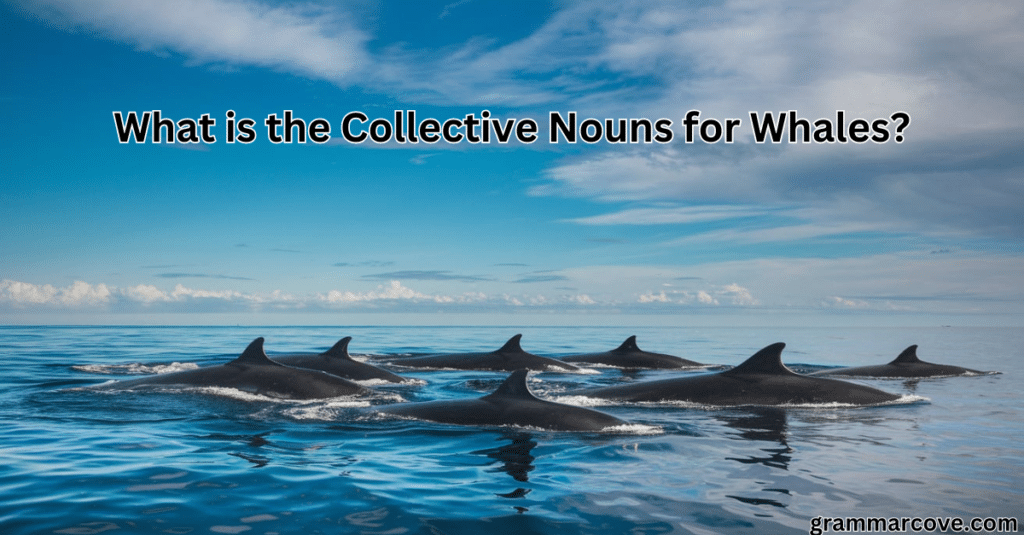Whales, some of the most majestic creatures of the ocean, exhibit fascinating social structures and behaviors. Exploring collective nouns for whales not only enriches our vocabulary but also deepens our appreciation for their ecological significance.
Whales, some of the most majestic creatures of the ocean, exhibit fascinating social structures and behaviors. Exploring collective nouns for whales not only enriches our vocabulary but also deepens our appreciation for their ecological significance. In this article, we’ll explore various collective terms for marine animals, particularly focusing on whales, while weaving in examples and scenarios to illustrate these concepts.
Understanding Collective Nouns
Importance of Collective Nouns
Collective nouns serve as a way to group animals, making it easier to describe their social structures. For instance, saying “a pod of whales” immediately conveys the idea of a social unit. This is especially relevant when discussing whale behavior in groups, which can vary significantly depending on the species and their social dynamics.
The Role of Whales in Marine Ecosystems
Whales play a vital role in maintaining marine biodiversity. Their presence helps regulate the populations of various species, and they contribute to nutrient cycling in the oceans. Let’s dive into the different collective nouns associated with whales.
Common Collective Nouns for Whales
1. Pod
A pod typically refers to a group of orcas and pods. Orcas, known for their intelligence and complex social structures, often travel in family groups. These pods can consist of anywhere from a few to several dozen individuals.
Scenario Example:
Subject: Planning an Orca Watching Trip
To: Sarah Thompson
Hi Sarah,
I just found out about a fantastic opportunity to observe a pod of orcas off the coast of Washington! These creatures are fascinating, especially considering their strong family bonds. I thought it would be great to plan a trip together.
Let me know what you think!
Best,
Mike
2. School
While “school” often refers to fish, it can also apply to whales and their habitats in specific contexts, especially when they gather in larger numbers for feeding or migration.
Scenario Example:
Subject: Whale Watching Adventure
To: Tom Harris
Hey Tom,
I heard there’s a chance to see a school of humpback whales migrating south. It would be amazing to witness their feeding habits together, especially since they often work in groups to herd fish. What do you think about joining me this weekend?
Cheers,
Lisa
3. Baleen
When referring to baleen whales, the term “baleen” can be used to describe a group. These whales, like blue and gray whales, possess baleen plates for filter feeding.
Scenario Example:
Subject: Research on Baleen Whales
To: Dr. Emily Nguyen
Dear Dr. Nguyen,
I’ve been diving into research on baleen whales and their unique feeding habits. It’s fascinating how a baleen of these whales can effectively filter large amounts of water. I’d love to discuss this further during our next meeting.
Best regards,
John
4. Gam
The term “gam” refers to a social gathering of whales, particularly when they are engaging in social behaviors or communication.
Scenario Example:
Subject: Observing a Whale Gam
To: Jenna Lee
Hi Jenna,
I just read about a phenomenon called a gam where whales come together to socialize. It sounds like an incredible event to witness! Would you be interested in organizing a trip to observe this?
Talk soon,
Derek
5. Team
In some contexts, especially when discussing the cooperative behavior of certain species, a group of whales can be referred to as a team.
Scenario Example:
Subject: Collaborative Research on Whale Social Behavior
To: Dr. Carlos Ramirez
Hello Dr. Ramirez,
I’m excited about our upcoming project on the social behavior of whales. Observing a team of killer whales coordinating their hunting techniques will be a significant part of our study. Let’s finalize our research plan soon.
Best,
Alice
Whale Communication and Social Structures

Whale communication is another intriguing aspect of their lives. They utilize complex vocalizations and physical gestures to interact within their groups. This social behavior is key to understanding their whale social structures and is essential for their survival.
Whale Vocalizations
Whales use various sounds for communication, including clicks, whistles, and songs. For example, humpback whales are known for their songs, which can last for hours. These vocalizations serve multiple purposes, from attracting mates to maintaining group cohesion.
Group Terminology for Whales
The terminology associated with whales isn’t just poetic; it reflects their social behavior and the relationships within their pods. Recognizing these terms helps in appreciating their complex lives.
| Collective Noun | Description |
|---|---|
| Pod | A family group, often of orcas or dolphins. |
| School | A gathering for feeding or migration. |
| Baleen | Refers to baleen whales in a group. |
| Gam | A social gathering of whales. |
| Team | A cooperative group, often seen in hunting. |
Whale Migration Patterns
Whales exhibit fascinating migration patterns based on feeding and breeding needs. For instance, gray whales travel thousands of miles from their feeding grounds in the Arctic to warmer breeding waters in Mexico.
Importance of Whale Migration
Understanding these patterns is crucial for whale conservation efforts. Protecting migratory routes ensures the survival of these long-lived marine species.
Scenario Example:
Subject: Whale Migration Research
To: Professor Emily Roberts
Dear Professor Roberts,
I’ve been studying the migration patterns of gray whales. Their journey from the Arctic to Mexico is astonishing, and it’s vital for us to understand these routes for effective whale conservation strategies. I’d love to share my findings with you soon.
Sincerely,
Max
Characteristics and Unique Features of Whales
Whales possess several unique features that contribute to their survival and adaptability in diverse habitats. From their size to their echolocation abilities, these characteristics enable them to thrive in the ocean.
Whale Feeding Habits
The feeding habits of whales vary widely among species. For example, some baleen whales filter feed, while others, like orcas, are apex predators that hunt in coordinated groups. Understanding these behaviors highlights their role in the ecosystem.
Scenario Example:
Subject: Observations on Whale Feeding
To: Jessica Brown
Hi Jessica,
I’m fascinated by the different feeding habits of whales. Observing how a pod of orcas hunts together is on my bucket list! We should plan a trip focused on this soon.
Cheers,
Liam
The Ecological Significance of Whales
Whales contribute significantly to the health of marine ecosystems. Their presence supports various marine species and helps regulate populations of fish and other prey. As they feed and migrate, they also facilitate nutrient cycling, which benefits the overall health of the oceans.
Marine Biodiversity
By studying whales, we can better understand marine biodiversity. Their interactions with the environment and other species create a balance that is essential for a thriving ecosystem.
Whale Watching: A Growing Interest
Whale watching has become a popular activity, allowing people to appreciate these magnificent creatures while contributing to conservation efforts. This growing interest promotes awareness about the need for whale conservation and protection of their habitats.
Scenario Example:
Subject: Exciting Whale Watching Experience
To: Rachel Green
Hi Rachel,
I just booked a whale watching tour for next month! We’ll have the chance to see different types of whale species in their natural habitats. I’m really excited about learning more about their social behavior while we’re out there.
Best,
Chris
Conclusion: The Significance of Collective Nouns
Understanding the collective nouns for whales not only enhances our communication about these incredible marine mammals but also highlights their importance in marine ecosystems. By recognizing their social structures and behaviors, we can foster a deeper appreciation for their role in maintaining ecological balance.
As we continue to explore and study these creatures, we must prioritize their conservation. The future of these long-lived marine species depends on our collective efforts to protect their habitats and ensure their survival for generations to come.
Final Thoughts
Whether you’re an avid whale watcher, a researcher, or simply curious about marine life, appreciating the nuances of whale behavior, social structures, and collective terms enriches our understanding of these extraordinary animals. Let’s continue to learn and advocate for the protection of our oceans and the majestic creatures that inhabit them.
4o mini


